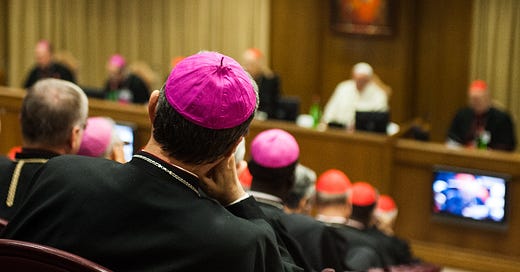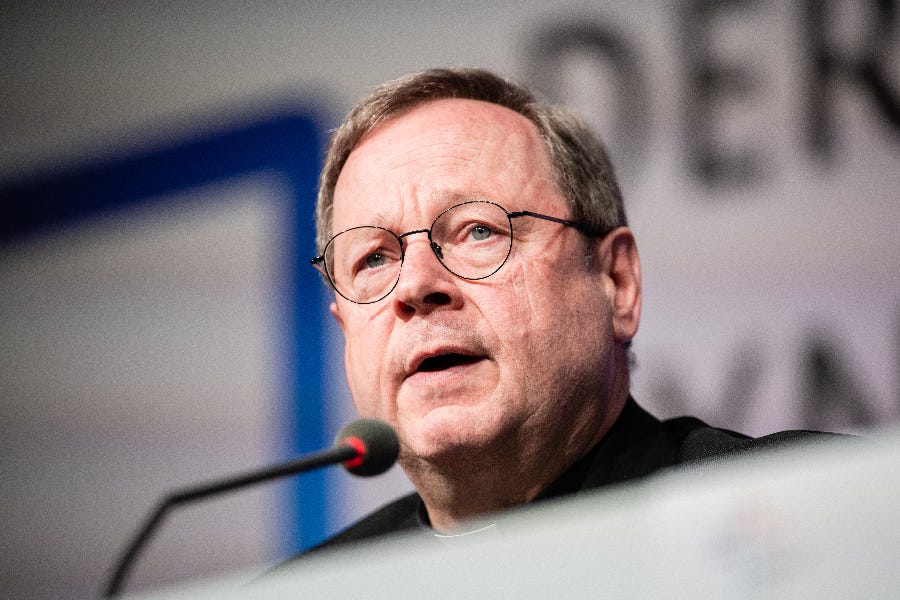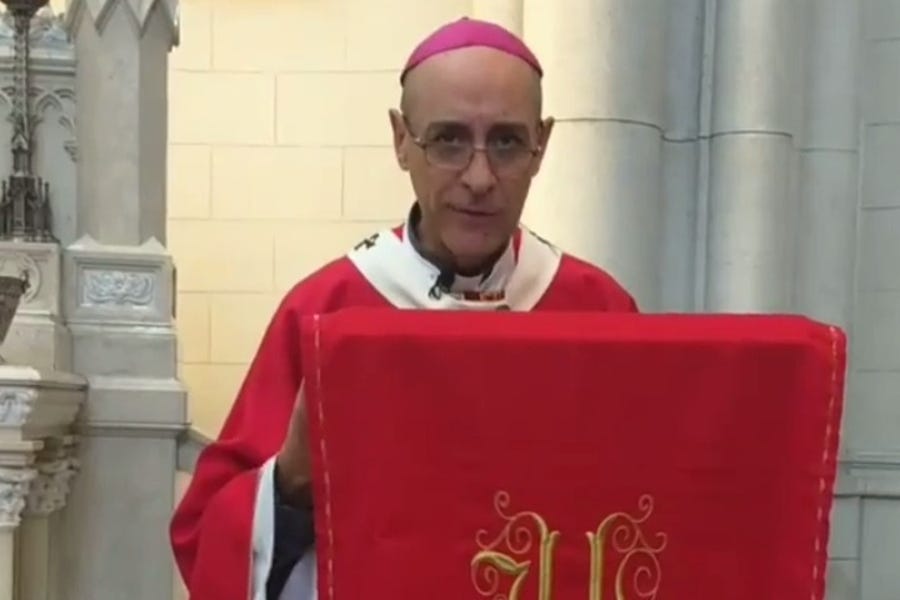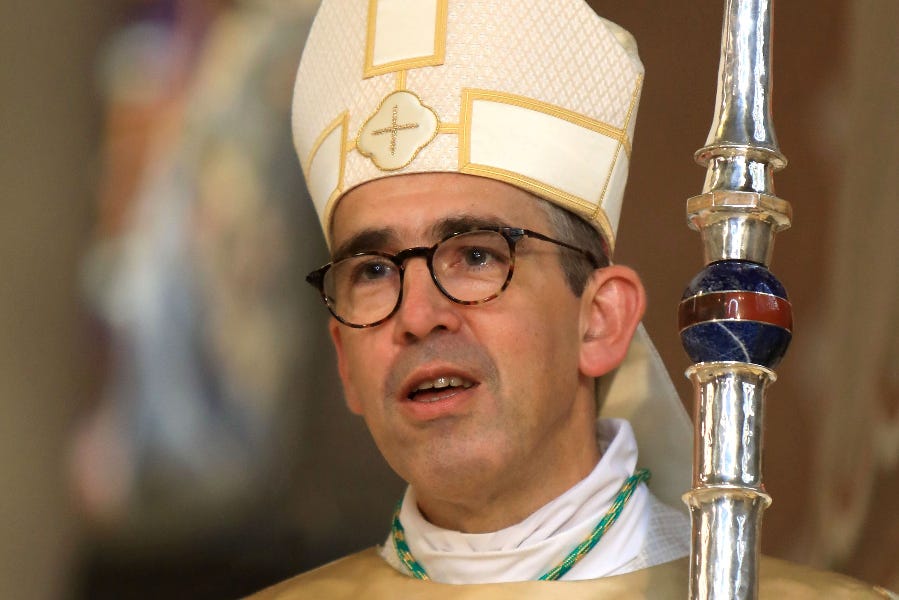
In their own words: The most quotable synod invitees
Before the Synod of Bishops begins next week, here's what the participates are saying about it, in their own words
Hundreds of Catholics from around the world will gather in Rome next week to take part in the long-awaited opening session of the synod on synodality.
They are, not surprisingly, a diverse group. Among them will be 363 voting members, including 54 women. Some will be attending as representatives of bishops’ conferences. Others have been appointed personally by Pope Francis. Others still will be attending as “fraternal delegates,” “spiritual assistants,” or “experts and facilitators.”
Many of the participants have been speaking publicly in recent weeks about their expectations of an event billed in some quarters as the most significant Catholic gathering since Vatican II.
What have they been saying? The Pillar takes a look.
Bishop Georg Bätzing
Bishop of Limburg, Germany, and German bishops’ conference president.
“... the decisive question for me remains whether we, through this further development of synodality, will find more confidence in a new hermeneutics, of understanding, of unity in the Catholic Church as a whole: Taking seriously decentralization, cultural diversity, social contexts of being Church, strengthened powers for bishops’ conferences, etc. I very much hope that in listening, it will become clear that already now our Church is more diverse than we realize from our respective perspectives. Particular churches go quite different ways in one spirit.”
dbk.de, Sept. 27, 2023.
—
Klára Csiszár
A Romanian-Hungarian-Austrian professor of pastoral theology in Linz, Austria, and one of the synod’s experts and facilitators.
“We will not ordain women deacons in November.”
katholisch.at, Sept. 19, 2023.
—
Cardinal Blase Cupich
The Archbishop of Chicago, United States, and a papal appointee to the synod on synodality.
“... we unfortunately have witnessed recent statements by some taking issue with the Holy Father’s decision to call a synod on synodality. Among the mistaken assertions, which are stoking fears, is that the gathering in Rome this October will radically alter church teaching and practice, align both with secular ideas and result in schism. History has shown that the use of fear tactics by those who resist any kind of renewal that involves change is not new.”
Chicago Catholic, Aug. 30, 2023.
—
Bishop Ramón Alfredo de la Cruz Baldera
Bishop of San Francisco de Macorís, Dominican Republic.
“We must first distance ourselves from everything that fundamentalism signifies, from believing that doctrine can’t be touched. That would be the first temptation we would have, to believe that doctrine can’t be touched. Doctrine is there in order to reflect, to see.”
CNA, Sept. 20, 2023.
—
Cardinal-elect Victor Manuel Fernández
Argentine prefect of the Vatican’s Dicastery for the Doctrine of the Faith.
“... [Pope Francis] does not believe that important changes in conflictive issues should be expected from this synod, since the time available would not be enough to study any of them in depth. It is rather a moment of reflection where the Church asks herself again who she is, what she is for, what God expects from her in this historical moment.”
La Nación, Sept. 26, 2023.
—
Bishop Felix Gmür
Bishop of Basel, Switzerland, and president of the Swiss bishops’ conference.
“The subordination of women in the Catholic Church is incomprehensible to me. Changes are needed there ... I am in favor of the ordination of women; it will also be a topic at the synod that will soon take place in Rome.”
CNA, Sept. 25, 2023.
—
Cardinal Jean-Claude Hollerich
Archbishop of Luxembourg and general rapporteur of the synod on synodality.
“The Holy Father often says: The Holy Spirit first confuses everything. One can see that on the day of Pentecost. They think they are drunk — and so on. And then afterward a new harmony arises. The individual synod participant must of course be ready for conversion, for personal conversion, and for synodal conversion. If I go in with the viewpoint: I already know everything, then I don’t listen, then I can’t carry out a discernment of spirits. And if I listen to the right and the left and go into this process together with the right and the left and pray, then a new harmony will emerge.”
katholisch.de, Sept. 20, 2023.
—
Fr. James Martin, SJ
A U.S. Jesuit priest and a papal appointee to the synod on synodality.
“So my hope? That we all listen to the Spirit, even when it challenges or disturbs us. My role? Again, an easy question: To listen to the Holy Spirit as it is active and alive in the other person, and active and alive in the discernment that has been going on for the last few years and gathered in the working document. I also hope to share some stories from the communities I know and minister with. Of course that includes the L.G.B.T.Q. community, but also, more broadly, various communities in the U.S. church.”
America Magazine, Sept. 27, 2023.
—
Cardinal Robert McElroy
Archbishop of San Diego, United States, and a papal appointee to the synod on synodality.
“The question of the ordination of women to the priesthood will be one of the most difficult questions confronting the international synods in 2023 and 2024. The call for the admission of women to priestly orders as an act of justice and a service to the church was voiced in virtually every region of our world church. At the same time, many women and men who participated in the synod favored reserving the priesthood for men in keeping with the action of Christ and the history of the church.”
America Magazine, Jan. 24, 2023.
—
Cardinal Gerhard Müller
German former prefect of the Dicastery for the Doctrine of the Faith and a papal appointee.
“I pray that all this will be a blessing and not a detriment to the Church. I am also committed to theological clarity so that a Church gathered around Christ does not become a political dance around the golden calf of the agnostic spirit of the age.”
InfoVaticana, Sept. 12, 2023.
—
Archbishop Andrew Nkea
Archbishop of Bamenda, Cameroon, and a member of the synod of bishops’ ordinary council
“We are not going to allow ourselves to be distracted by the social media antics; there will be no room for distraction ... The aim of the synod is to reflect on the Church we have and how we want it to be and not to change the doctrine of the Church.”
ACI Africa, Sept. 25, 2023.
—
Bishop Matthieu Rougé
Bishop of Nanterre, France.
“Work on synodality can take us forward if it is truly founded on Christ and the Gospel. It seems to me that we need to avoid focusing on deliberative synodality, but rather ground it in contemplative synodality with a view to missionary synodality, i.e. the participation of all in proclaiming the Good News of Salvation.”
National Catholic Register, Aug. 3, 2023.
—
Anna Rowlands
Professor of Catholic Social Thought and Practice in England, named among the synod’s experts and facilitators.
“There’s a fear of that in some quarters, that this is a synod that’s going to make big doctrinal changes — some fear that, some desperately hope for it. I think both groups will be quite disappointed if they’re looking for big doctrinal change because the pope’s focus is on the ‘who’ of the Church, on the question of the way in which our life itself is focused on mission to the world.”
cbcew.org.uk, Sept. 19, 2023.
—
Cardinal Christoph Schönborn
Archbishop of Vienna, Austria, and a member of the synod of bishops’ ordinary council.
“I have participated in a good number of synods and I remember interventions by men and women, lay people, experts, listeners, who had a profound impact on the proceedings. This time we go one step further to involve these voices. There will still be experts in this synod, there will still be delegates from the other fraternal Churches. I think it’s simply enriching.”
Vatican News, Sept. 19, 2023.
—
Fr. Thomas Schwartz
Head of the German Catholic charity Renovabis and a “special invitee” to the synod.
“After the Reformation came great personalities like Ignatius of Loyola, John of the Cross, or Teresa of Avila. Thus, this Church remained in motion. In an emergency, the good shepherd is needed. This is also how I see Francis. He wants to go into the future. In an emergency, he must carry those who have stopped for fear or other reasons. He does not force them on the way, but he carries them on his shoulders. This is likely to become a real burden for him in the coming years.”
katholisch.de, Sept. 4, 2023.
—
Cardinal Matteo Zuppi
Archbishop of Bologna, Italy, and a member of the synod of bishops’ ordinary council
“Today, beyond polemics, we risk the polarization of indifference, often accentuated by disillusionment, whereby other ecclesial realities or personalities are ignored or deprecated. Synodality means questioning the entrenched ecclesial solitudes in encounter, in communion, in listening, in the enormous missionary commitment that awaits us by confronting the crowd and its sufferings. After all, it is the disease of society that takes the Church and isolates one from the other, perhaps in opposition. Instead, never without the other!”
chiesacattolica.it, Sept. 25, 2023.
—
Pope Francis
Bishop of Rome, Vicar of Jesus Christ, Successor of the Prince of the Apostles, Supreme Pontiff of the Universal Church
“The Synod now taking place is – and should be – a journey in accordance with the Spirit, not a Parliament for demanding rights and claiming needs in accordance with the agenda of the world, nor an occasion for following wherever the wind is blowing, but the opportunity to be docile to the breath of the Spirit.”
Vatican.va, Mass of Pentecost, 2023











"If I might, I would also like to share a concern about the synod. Based upon the hundreds of interventions I read when I was monitoring the pre-synodal process in my pastoral region in California, upon the findings of the Continental stage, and upon the Instrumentum laboris itself, I would say that the dominant concern of those who participated is to provide a greater sense of welcome to those who feel alienated from the life of the Church. The people they have in mind include especially women and those in the LGBT community. Now, addressing feelings of alienation and trying to make the Church as welcoming as possible is always a legitimate pastoral concern. Always.
But some have been suggesting that the synod ought to consider a change in the Church’s moral teaching and sacramental discipline in order to make alienated Catholics feel more included. And here I hesitate, precisely because feelings, however intense, do not in themselves constitute a theological argument. There is a variety of reasons—some good, some bad—why a person might feel unwelcome in the Church. If that alienation is the product of hatred or stupid prejudice, then the situation must be addressed immediately and directly. But if the estrangement is caused by a deep disconnect between what the Church legitimately demands and the manner in which someone is living, then the needful thing is for that person to change his attitude. The point is that we cannot adjudicate the matter by remaining at the level of feelings. We have to move to the level of real argument based on the Bible, the theological tradition, and the natural moral law. My very real hope is that the engagement of both the pastoral and properly theological dimensions of this issue of inclusivity will be a key work of the synod."
-Bishop Barron
https://www.wordonfire.org/articles/barron/as-i-leave-for-the-synod-on-synodality/
The amount of division here on the basic principles and goals is impressive.